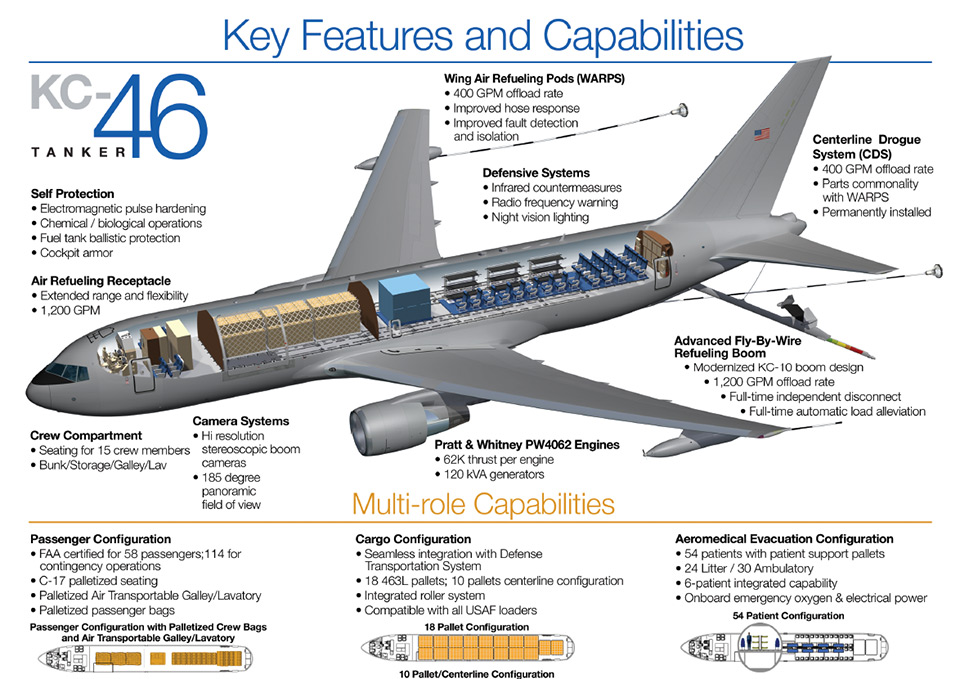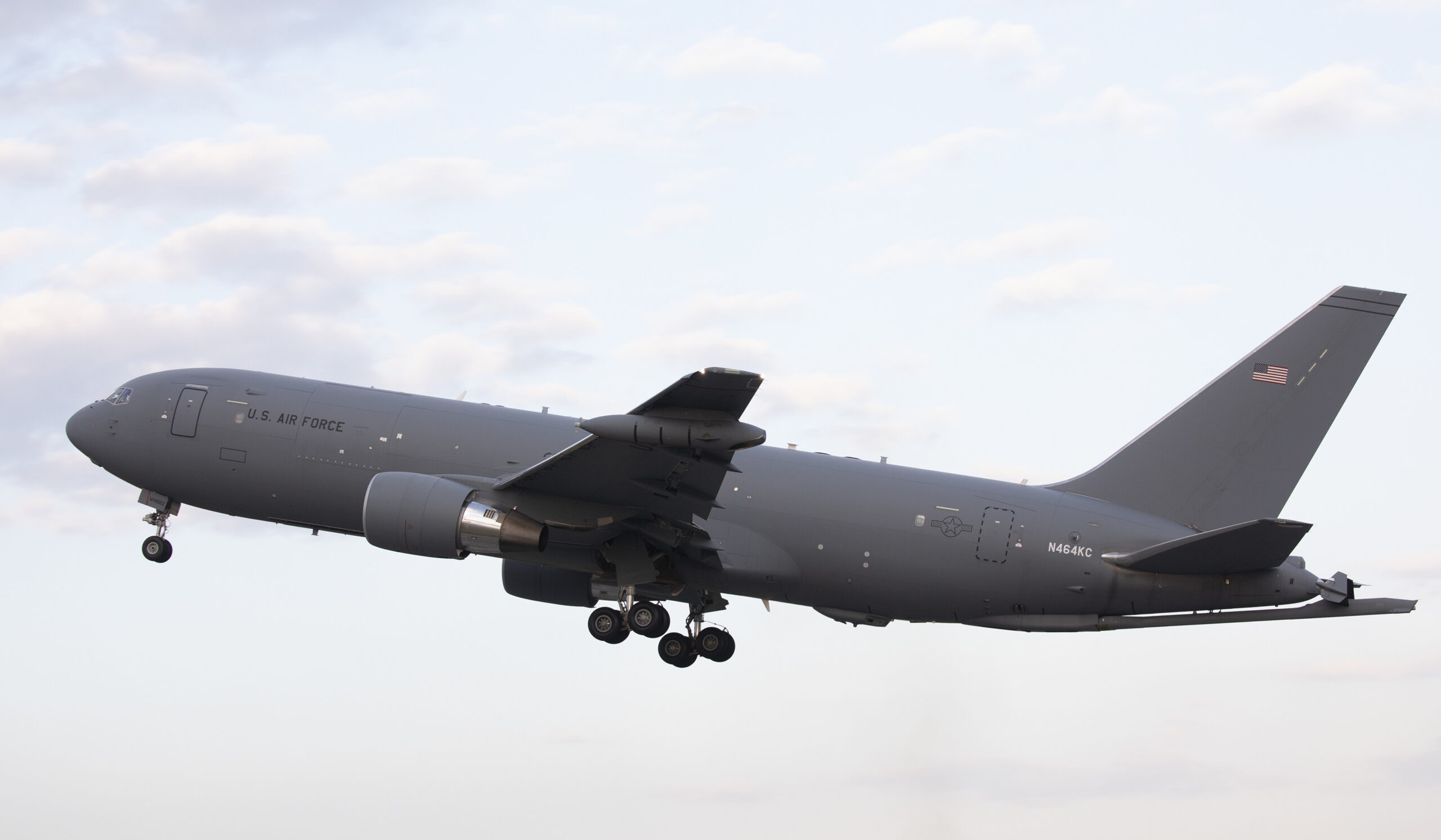
KC-46A refueler
Strategic Shift in Israel’s Defence Posture
Israel plans to acquire additional KC-46A refuelers and invest $1.5 billion in armored vehicles as part of a comprehensive modernization strategy. The decision underscores the Israel Defense Forces’ (IDF) need to sustain long-range operations and reinforce its ground maneuver capabilities in a volatile regional environment.
The Israeli Ministry of Defense confirmed that Director General Maj. Gen. Amir Baram has instructed officials to finalize the contract for two additional KC-46A Pegasus refueling aircraft once approval is secured from the Defence Procurement Ministerial Committee.
KC-46A Tankers: Extending Israel’s Reach
Israel plans to acquire more KC-46A refuelers and invest $1.5 billion in armored vehicles while its air force relies on aging Boeing 707s for strategic missions. Boeing will tailor the KC-46A with Israeli systems to meet the unique operational needs of the Israeli Air Force (IAF).
The $500 million deal, funded through US military aid, adds a fifth and sixth KC-46A to Israel’s fleet. These aircraft will extend Israel’s ability to strike distant targets, a necessity demonstrated in operations ranging from Gaza to Yemen and during last year’s dramatic 12-day confrontation with Iran.

Former IAF commander Ido Nehushtan, now Boeing Israel’s president, highlighted that the KC-46A will provide the “world’s most advanced multi-mission refueling capability.” For Israel, the acquisition strengthens its long-range strike arm and enhances readiness for potential multi-front conflicts.
Other than KC-46A, $1.5 Billion for Tanks and Armoured Vehicles
Alongside the decision for KC-46A procurement, Israel will acquire more KC-46A refuelers and invest $1.5 billion in armored vehicles under the Armored Vehicle Acceleration Project. The Ministry of Defence, led by Defence Minister Yoav Gallant and Baram, presented a plan worth 5 billion shekels to the Defence Procurement Committee to expand tank and APC capacity over the next five years.
The program, run by MANTAK (the Merkava and Armoured Vehicles Directorate) in cooperation with the IDF Ground Forces and other directorates, will accelerate production of Merkava IV Barak tanks and supply more Namer and Eitan APCs.
Merkava IV Barak: Backbone of Israel’s Armour
Israel plans to buy more KC-46A refuelers and invest $1.5 billion in armored vehicles. Delivering the Merkava IV Barak tank, which debuted in 2023, is the primary focus. This advanced tank features new sensors, AI-driven situational awareness, and improved protection for modern battlefield conditions.
It continues the Merkava legacy, which has been the backbone of Israel’s armored brigades since 2016. To meet wartime demand, reserve brigades are now returning to older Merkava III tanks. This allows regular army formations to continue training with the newer Merkava IV fleet. The call for 60,000 reservists for Gaza operations underscores the strain on Israel’s reserve system.
Namer and Eitan APCs: Flexibility for Modern Battlefields
Israel will also expand its APC fleet as part of the acquisition of more KC-46A refuelers and the $1.5 billion investment in armored vehicles. The tracked Namer, derived from the Merkava chassis, provides heavy protection for infantry. The wheeled Eitan, operational since 2023, offers mobility and versatility. Equipped with 30 mm cannons, the Eitan strengthens Israel’s urban warfare capability while complementing heavier tracked units.
This dual approach enhances Israel’s ability to operate in both dense urban terrain and open battlefields, addressing lessons learned from recent conflicts.

Domestic Production and Industrial Impact
Israel plans to buy more KC-46A refuelers and invest $1.5 billion in armored vehicles. This move will strengthen Israel’s defense-industrial base while supporting long-term military and economic stability. The Ministry of Defence has confirmed that it will award contracts to dozens of Israeli firms across various regions.
This approach boosts national security while also strengthening economic resilience in communities outside Israel’s main industrial hubs. The initiative follows the ministry’s “domestic first” policy, which prioritizes homegrown production and local defense capabilities.
Expanded infrastructure at IDF depots and private facilities will increase output and efficiency for future military needs. These upgrades ensure Israel can sustain long conflicts without becoming overly dependent on foreign supply chains.
Integration of FPV Drones
In addition to KC-46A tankers and tanks, Israel is to acquire more KC-46A refuelers and invest $1.5 billion in armored vehicles while simultaneously investing millions in thousands of FPV drones from Israeli firm XTEND. We intend to enhance tactical flexibility with these drones, equipped with advanced sensors and combat payloads.
Delivery will begin in the coming months, accompanied by training programs for IDF personnel. The ministry expects these drones to significantly increase the effectiveness of ground operations, providing rapid, precision-strike options in contested environments.

Strategic and Economic Implications
Israel plans to buy more KC-46A refuelers and spend $1.5 billion on new armored vehicles. The IDF faces simultaneous threats across different theaters, making this investment critical for maintaining operational flexibility and readiness.
Defense Minister Israel Katz stressed that the initiative strengthens Israel’s qualitative edge, ensuring security while also fueling economic growth. He emphasized that national security and economic stability must work together, demonstrating how defense investment benefits the wider population.
Israel’s defense industry will benefit from this spending, which will support hundreds of companies, preserve jobs, and strengthen long-term industrial resilience. The investment ensures the IDF stays fully prepared for future conflicts, with modern capabilities both in the air and on land.









